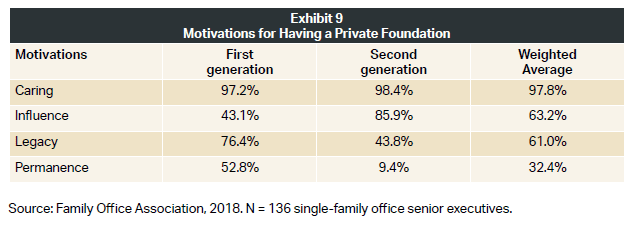Giving Back: When The Super Rich Can Teach Us
Updated on July 9th, 2020 | By Anthony Glomski  | Leave a Comment
| Leave a Comment

It would be an understatement to say these are challenging times. Despite ominous headlines, we’re encouraged at AG Asset Advisory by the growing desire we see in people to give back and help. The Dalai Lama was once asked if capitalism is bad. He responded that the ability to create wealth is a gift—and that gift can be used for good.
In this post, we’ll explore how you can potentially amplify your gift and think through different scenarios that make sense for you, your family, and your unique situation. We’ll cover just some of the options available.
Key Takeaways:
-
A formal, organized approach to charitable giving is preferable to “checkbook philanthropy.”
-
A philanthropic advisor might be best suited to help you in your efforts.
- The strategies used to give back should be in alignment with your values and motivations.
As an investor’s net worth grows, it often fuels a rise in the desire to “do good” through charitable contributions.
This philanthropic drive comes as no surprise to us. In working with individuals and their advisors, we’ve found that one of the primary financial concerns of the affluent centers around charitable giving. Investors want to know how to give wisely and magnify the impact of their philanthropy.
If this is you, it may be helpful to examine some of the charitable giving trends, patterns, and preferences among the Super Rich (individuals with more than $500 million in net worth). Lessons from the Super Rich can often be incorporated into our own approaches to various financial strategies and wealth planning.
You’ll also want to consider how charitable giving affects your taxes. There tends to be a tremendous amount of interplay with tax savings and wealth transfer the minute a successful entrepreneur becomes interested in philanthropy. Good charitable planning can be a cornerstone of significantly lowering your tax bill, as covered here. It’s also a core part of most family offices. Considering taxes may keep more money in your pocket and potentially increase the size of your gift.
Blake Christian, a Park City Tax CPA, notes that “simple strategies of gifting appreciated assets to lower tax bracket family members or to charitable organizations can result in overall tax benefits. Also, for older taxpayers receiving Required Minimum Distributions, direct payment to charitable organizations will also produce net benefits to the donor.”
If you’re curious about whether your approach to charitable giving is the right one, contact us at AG Asset Advisory. We’re happy to help.
Generational Giving Among the Extremely Wealthy:
Many Super Rich families (those with $500 million or more) believe in giving back. They want to make a discernible and significant difference in the lives of others, society, and the world.
We make this conclusion by examining single-family offices—structures that many Super Rich families use to help them manage their financial lives. A significant majority of family offices (62.8 percent) are very or extremely involved in philanthropy (see Exhibit 6).
Interestingly, as seen in Exhibit 6, far more of the second-generation family offices have high levels of charitable involvement. (Generally, first-generation family offices are those controlled by the generation that initially created them—patriarchs and matriarchs; second-generation family offices are owned and controlled by the heirs of the original creators.)
Exhibit 6
Philantrhopic Involement of Single-Family Offices
- First Generation: 51.6%
- Second Generation: 81.3%
- Weighted Average: 62.8%
Source: Family Office Assocation, 2018. N = 176 single-family office senior executives.
While it may look like roughly 40 percent of these Super Rich families aren’t all that philanthropic, that’s not necessarily the case. Sometimes their charitable activities aren’t run through their single-family offices. This tends to be more common with wealth creators than with wealth inheritors. Nevertheless, we see that the second generation is generally highly focused on philanthropy, and they tend to run the activities of their philanthropy in conjunction with (or through) their single-family offices.
Nearly 8 out of 10 of the senior executives at these single-family offices who were surveyed said they expect the families to become even more involved in philanthropic pursuits in the future (see Exhibit 7). Here again, there’s a stronger trend among the second-generation family offices.
Exhibit 7
Greater Involvement in Philarnthropy
- First Generation: 65.3%
- Second Generation: 94.7%
- Weighted Average: 78.4%
Source: Family Office Assocation, 2018. N = 176 single-family office senior executives.
The upshot: It may be that younger members of today’s highly affluent families are especially philanthropically inclined. Ask yourself how this dynamic plays out in your own family: Are the younger generations particularly interested in making a charitable impact?
Use of Philanthropic Advisors
We also see some clear differences in the extent to which the Super Rich (those with $500 million or more) seek help and guidance with their philanthropy
“29.1 percent of the senior executives at single-family offices engaged philanthropic advisors at one time or another.”
CLICK TO TWEET
Philanthropic advisors are professionals who assist people and families in thinking through which charitable causes and nonprofits to support.
(Note: Philanthropic advisors rarely address the tax implications of their clients’ giving. To deal with the tax considerations, wealth managers, accountants, and attorneys are usually the go-to professionals.)
However, while more than two out of five (41.9 percent) senior executives of first-generation single-family offices have engaged philanthropic advisors, a mere 8 percent of senior executives at second-generation single-family offices are using these professionals.
Why the significant generational difference? Although it’s not entirely clear, it’s possible that many of the wealth creators—the founders of single-family offices—are more focused on creating the family fortune than on philanthropy. Therefore, they tend to enlist philanthropic advisors for guidance.
In contrast, the heirs—the second generation—may have had more opportunities to develop strong opinions about (and experience with) charitable giving. They may have even learned from the philanthropic advisors hired by their parents and decided to move forward on their own.
Access the Top 10 Wealth Planning Strategies for Successful Entrepreneurs

Access the Top 10 Wealth Planning Strategies for Successful Entrepreneurs
The Appeal of Private Foundations
In our experience, a lot of people—including the affluent—engage in “checkbook philanthropy,” where individuals send cash or checks to the not-for-profits they care about. Often there is little-to-no planning surrounding this type of giving—donations are made sporadically and without regard to other financial issues and needs.
In contrast, we see that the Super Rich tend to be more formal and systematic about their giving.
Example: Nearly seven out of ten of the family offices surveyed have set up formal private foundations (see Exhibit 8). This is proportionately more the case for the second generation than for the first generation.
Exhibit 8
Have a Private Foundation
- First Generation: 58.1%
- Second Generation: 85.3%
- Weighted Average: 68.3%
Source: Family Office Assocation, 2018. N = 176 single-family office senior executives.
We see that people create private foundations for many reasons, including:
- Caring. A private foundation is a very powerful way to convert caring into financial support for worthy causes. You need to care deeply about specific charitable causes to justify forming a foundation.
- Influence. Being able to shape society’s agenda by influencing the decision-making process is gaining considerable attention from the Super Rich. Although private foundations can’t participate in lobbying activities or support political candidates, they may be able to help fund certain types of advocacy to influence broad issues and policies aimed at furthering their charitable goals without being specific to particular legislation or candidates.
- Legacy. Many people create private foundations to honor loved ones. They’re effective in binding a family together around something they consider meaningful. Many times, private foundations are used to help educate inheritors about how to become wise philanthropists.
- Permanence. A private foundation can be established in perpetuity. Consequently, you can ensure that the charitable institutions and causes important to you will continue to be funded indefinitely.
Note, however, that generational differences come into play here as well (see Exhibit 9). Both first- and second-generation family offices say that “caring” is a motivator for having a private foundation. But “influence” is a much more significant driver for second-generation family offices—while “legacy” and “permanence” matter more to first-generation family offices.

Lessons to Learn:
The takeaway from these findings is not that you need to set up a private foundation. The costs and ongoing management duties associated with private foundations make them unrealistic for most families. Tax CPA Blake Christian notes that the fact that the IRS Form 990’s are public information can also dissuade the wealthy from setting up their own foundation.
Instead, consider your own reasons for wanting to engage in philanthropy. What is important to you in terms of your giving? Do you share some or all of the same motivators as the Super Rich?
Additionally, you can take a page from the Super Rich playbook by being highly organized and systematic with your own giving. Instead of giving when the mood strikes, consider adopting a giving strategy that is carefully planned. Giving options such as donor-advised funds and certain types of trusts can potentially enable you to make charitable giving a component of an overall wealth plan.
This is where AG Asset Advisory can help. We’d love to talk to you about insights into philanthropy and perhaps even assist in vetting specific charitable organizations. Contact us to get the conversation started.
0 Comments
Submit a Comment
Meet Anthony
Anthony Glomski is the founder of AG Asset Advisory, an internationally recognized SEC-registered Family Office. His team works extensively with entrepreneurs so they don’t miss out on any potential opportunities and they get the results they want. This collaborative process addresses an array of family, financial, and lifestyle concerns along with coordination and oversight of various professionals to keep everyone focused tightly on their goals.
0 Comments
Submit a Comment

Work With Us
Contact:
Our Mission:
We design bespoke wealth planning strategies and customized solutions for highly successful entrepreneurs that avoid missing potential opportunities and achieve the outcomes you want.





Meet Anthony
Anthony Glomski is the founder of AG Asset Advisory, an SEC-registered Family Office. His team works extensively with successful entrepreneurs so they don’t miss out on any potential opportunities and get the results they want. This collaborative process addresses an array of family, financial, and lifestyle concerns along with coordination and oversight of various professionals to keep everyone focused tightly on their goals.